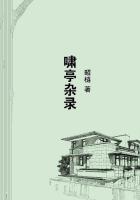"But, Alessandro," continued Ramona, "were there really bad men at the other Missions? Surely not the Franciscan Fathers?"
"Perhaps not the Fathers themselves, but the men under them. It was too much power, Majella. When my father has told me how it was, it has seemed to me I should not have liked to be as he was. It is not right that one man should have so much power. There was one at the San Gabriel Mission; he was an Indian. He had been set over the rest; and when a whole band of them ran away one time, and went back into the mountains, he went after them; and he brought back a piece of each man's ear; the pieces were strung on a string; and he laughed, and said that was to know them by again,--by their clipped ears. An old woman, a Gabrieleno, who came over to Temecula, told me she saw that. She lived at the Mission herself. The Indians did not all want to come to the Missions; some of them preferred to stay in the woods, and live as they always had lived; and I think they had a right to do that if they preferred, Majella. It was stupid of them to stay and be like beasts, and not know anything; but do you not think they had the right?"
"It is the command to preach the gospel to every creature," replied the pious Ramona. "That is what Father Salvierderra said was the reason the Franciscans came here. I think they ought to have made the Indians listen. But that was dreadful about the ears, Alessandro. Do you believe it?"
"The old woman laughed when she told it," he answered. "She said it was a joke; so I think it was true. I know I would have killed the man who tried to crop my ears that way."
"Did you ever tell that to Father Salvierderra?" asked Ramona.
"No, Majella. It would not be polite," said Alessandro.
"Well, I don't believe it," replied Ramona, in a relieved tone. "I don't believe any Franciscan ever could have permitted such things."
The great red light in the light-house tower had again blazed out, and had been some time burning before Alessandro thought it prudent to resume their journey. The road on which they must go into old San Diego, where Father Gaspara lived, was the public road from San Diego to San Luis Rey, and they were almost sure to meet travellers on it.
But their fleet horses bore them so well, that it was not late when they reached the town. Father Gaspara's house was at the end of a long, low adobe building, which had served no mean purpose in the old Presidio days, but was now fallen into decay; and all its rooms except those occupied by the Father, had been long uninhabited. On the opposite side of the way, in a neglected, weedy open, stood his chapel,-- a poverty-stricken little place, its walls imperfectly whitewashed, decorated by a few coarse pictures and by broken sconces of looking-glass, rescued in their dilapidated condition from the Mission buildings, now gone utterly to ruin. In these had been put handle-holders of common tin, in which a few cheap candles dimly lighted the room. Everything about it was in unison with the atmosphere of the place,-- the most profoundly melancholy in all Southern California. Here was the spot where that grand old Franciscan, Padre Junipero Serra, began his work, full of the devout and ardent purpose to reclaim the wilderness and its peoples to his country and his Church; on this very beach he went up and down for those first terrible weeks, nursing the sick, praying with the dying, and burying the dead, from the pestilence-stricken Mexican ships lying in the harbor.
Here he baptized his first Indian converts, and founded his first Mission. And the only traces now remaining of his heroic labors and hard-won successes were a pile of crumbling ruins, a few old olive-trees and palms; in less than another century even these would be gone; returned into the keeping of that mother, the earth, who puts no head-stones at the sacredest of her graves.
Father Gaspara had been for many years at San Diego. Although not a Franciscan, having, indeed, no especial love for the order, he had been from the first deeply impressed by the holy associations of the place. He had a nature at once fiery and poetic; there were but three things he could have been,-- a soldier, a poet, or a priest.















